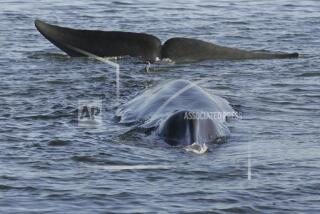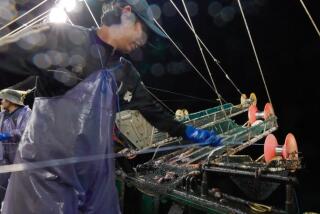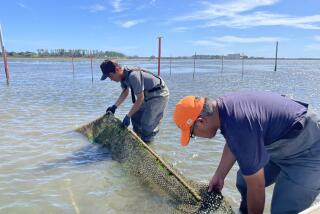North Sea Fishermen an Endangered Species
PETERHEAD, Scotland â Sandy Wood slips a gloved hand under the gills and tugs a gleaming three-foot cod from the pile of brown-speckled fish his trawler Searcher has just hauled into port.
But big catches like this, netted on a nine-day voyage through the blustery waters between Scotland and Norway, are becoming a thing of the past.
âAll the fish are getting scarcer. Itâs getting worse all the time, and this year the situation deteriorated very fast,â Wood, 42, explained over the din of hollering auctioneers and screeching gulls at Peterheadâs quayside market.
Earlier this month, the European Union imposed stringent new quotas for cod and other species from the Arctic to the Mediterranean.
North Sea cod catches will be cut by half next year. Big reductions also were imposed for haddock, whiting and other North Sea stocks.
The cod cuts, prompted by scientistsâ warnings that the once plentiful fish is in danger of commercial extinction, have spread dread through the gray granite cottages and kirks of the fishing communities that hug the craggy coastline of northeast Scotland.
âThis year the codâs in collapse, and if the fishing industry is in a bad way, itâs felt right through the town, right down to the little corner shop,â says George Geddes, the local fishermenâs representative and skipper of the trawler Scotia.
The plight of North Sea cod has provoked alarmist headlines in Britain, with talk of a fishing ban and the demise of the national dish, fish and chips. Londonâs trendy Conran restaurant group has removed cod from its menu, saying it wants to preserve dwindling stocks.
Although some reports have been exaggerated, the situation is grave.
âThe estimate of cod stocks is around 2 1/2 times below what we would consider a reasonable biological level,â says Hans Lassen, fisheries advisor at the International Council for the Exploration of the Sea in Copenhagen.
A Worldwide Crisis
In the 1980s, Britainâs fishing fleets hauled 300,000 tons of cod a year out of the North Sea. This year, they have caught barely 50,000 tons. The council says stocks of other major catches such as haddock and whiting are âoutside safe biological limits,â threatening a North Sea industry worth nearly $490 million a year.
Conservationists say itâs part of a worldwide crisis about to engulf the industry as too many fishermen chase too few fish.
âThirty-five percent of the worldâs resources are overfished,â says Dr. Paul Johnston, research scientist with the environmental group Greenpeace at the University of Exeter in southwest England.
âWe canât keep on doing it,â he says, otherwise âfish is going to become a luxury item.â
The sardine catch, mainstay of Portugalâs fleet, is reported down by 30%. And French and Spanish fishermen will feel the 41% reduction in the hake quota. But the Scottish cod boats stand to bear the brunt.
âThere are tough times ahead,â EU Fisheries Commissioner Franz Fischler warned on a recent visit to Peterhead, Europeâs biggest whitefish port.
âThe stocks are more or less exhausted, and drastic measures are needed to guarantee their continued existence,â Fischler told reporters after returning to EU headquarters in Brussels.
About one-third of Peterheadâs 23,000 people depend on fishing for their livelihood, and many fear the Scottish coast will go the way of Canadaâs maritime provinces a decade ago.
Overfishing there exhausted the worldâs richest cod grounds, forcing the government to impose a fishing moratorium to allow stocks to recover. The collapse wiped out 42,000 jobs, and a decade later the fish have still not returned.
An hour before dawn on a chill November day at Peterhead fish market, itâs hard to imagine a crisis.
In vast sheds curving around the harbor, trays are heaped with whiting and haddock, monkfish ready for export to Spain and France, sleek dogfish, plaice and rays and the big gray-brown cod whose lifeless eyes stare from packs of ice.
EU Looks for Solutions
Some fishermen attribute the declining stocks to changing currents, pollution, global warming, and industrial boats from Denmark that scoop fish from the waters to turn them into fertilizer.
Wood, who has been fishing since he joined his father in the business at age 16, says warmer waters and overfishing are part of the problem, but so is the quota system, which he says forces fishermen to throw dead fish back into the water. He calls it âraping the sea.â
Recognizing the problem, the EU is preparing other solutions, such as limiting the number of days boats can fish; setting aside âno-fishâ zones in the North Sea; widening mesh sizes to skip smaller fish; and buying up boats to reduce fleet sizes.
Gathered for a mug of hot tea at Aberdeenâs early-morning fish market, fish merchants say things are worse than ever.
âItâs time to sell out, but thereâs nobody buying,â says one, John Sutherland.
Hamish Morrison, chief executive of the Scottish Fishermanâs Federation, negotiated with the EU, trying to secure a deal that would save his men--and the fish.
âThe fishermen,â he says, âare an endangered species.â
More to Read
Sign up for Essential California
The most important California stories and recommendations in your inbox every morning.
You may occasionally receive promotional content from the Los Angeles Times.










